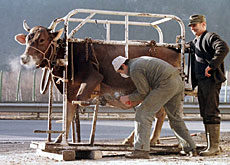Milk quotas under pressure

Farmers are taking the authorities to task over the planned liberalisation of the milk market.
The government is planning to dump milk quotas for producers as part its upcoming revision of agricultural policy.
Milk quotas, first introduced on the Swiss market in 1977 to counter overproduction, were aimed at guaranteeing minimum prices for farmers.
Production had increased at the time because of government-guaranteed prices, but sales had failed to keep up.
To counter the glut of milk, the authorities gave each farm the right to produce a set quantity, based on the previous years’ results. For the past 20 years, Switzerland’s milk production has hardly varied.
Switzerland wasn’t alone in setting limits on milk production at the time. The European Union (EU), Norway and Canada use the same system. Along with Switzerland, the EU is also considering scrapping its quotas.
The Swiss system was last modified in 1999. Since then, dairy farmers have been able to sell or lease their quotas to other producers.
Increased quotas
The federal authorities have also increased quotas in the past few years, three per cent in 2001, and another 1.5 this year. Swiss milk producers haven’t been entirely happy with these decisions, though, because they are having trouble shifting the growing butter mountain.
“Switzerland has 4,000 tonnes of butter in storage, about ten per cent of its annual production,” said Samuel Lüthi, director of the Swiss Federation of Milk Producers. “To get rid of it, we would have to sell it for SFr2 per kilo.”
The authorities admit that the system is far from perfect, which is why they plan to phase out quotas.
“The problem is that selling or leasing quotas is an expensive business,” said Jacques Chavaz, deputy director of the Federal Agriculture Office, “and totally unnecessary.”
Production and pricing
For Chavaz, it makes no sense to have production levels managed by state decree while pricing remains first and foremost a private affair.
This is because since 1999, the government no longer guarantees a set price for milk.
For the past three years, prices are set according to how the milk is processed. The price of a kilogram of milk will, for example, vary depending on whether it is used for Gruyère or Emmental cheese.
The government, which has set a target price for milk, can only intervene if the market price drops more than ten per cent below the general level.
The result was that the price of milk dropped from SFr.0.87 to SFr0.80 the day fixed prices were abandoned.
Producers expect to drop at least another five centimes in the coming months. They fear a kilogram of milk could eventually earn farmers less than half a franc.
The government wants to progressively get rid of quotas, as well as target pricing. But farmers are against any change to the system.
The Swiss Farmers’ Union admits that the system is far from perfect, but says getting rid of it would cause more problems than it would solve.
Dairy producers fear a return to overproduction and, more importantly, a drop in prices.
Farmers are set to clash with the authorities. A meeting between the main actors in the Swiss milk market is set for early September, perhaps a final opportunity to wrangle some concessions from the government.
swissinfo

In compliance with the JTI standards
More: SWI swissinfo.ch certified by the Journalism Trust Initiative
You can find an overview of ongoing debates with our journalists here . Please join us!
If you want to start a conversation about a topic raised in this article or want to report factual errors, email us at english@swissinfo.ch.